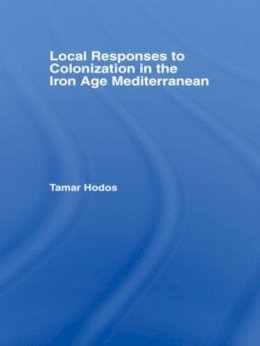
Stock image for illustration purposes only - book cover, edition or condition may vary.
Local Responses to Colonization in the Iron Age Mediterranean
Tamar Hodos
€ 80.25
FREE Delivery in Ireland
Description for Local Responses to Colonization in the Iron Age Mediterranean
Paperback. Compares responses to colonization in the Iron-Age Mediterranean. From North Syria to Sicily and North Africa, this title explores the responses to these colonies in areas where Greeks and Phoenicians were in competition with one another via the same local communities. It is suitable for students of archaeology and history. Num Pages: 274 pages. BIC Classification: 1QRM; HDDA. Category: (UP) Postgraduate, Research & Scholarly. Dimension: 234 x 156. Weight in Grams: 437.
The first study to bring together such a breadth of data, this book compares responses to colonization in the Iron-Age Mediterranean.
From North Syria to Sicily and North Africa, Tamar Hodos explores the responses to these colonies in areas where Greeks and Phoenicians were in competition with one another via the same local communities.
Highlighting the diversity of interest displayed by local populations in these foreign cultural offering, Hodos charts their selective adaptation, modification and reinterpretation of Greek and Phoenician goods and ideas as their own cultures evolve.
For students of archaeology and history, this will provide an essential resource for their degree course studies.
Product Details
Format
Paperback
Publication date
2008
Publisher
Taylor & Francis Ltd United Kingdom
Number of pages
274
Condition
New
Number of Pages
4
Place of Publication
London, United Kingdom
ISBN
9780415490986
SKU
V9780415490986
Shipping Time
Usually ships in 4 to 8 working days
Ref
99-1
About Tamar Hodos
University of Bristol, UK
Reviews for Local Responses to Colonization in the Iron Age Mediterranean
'This book's great contribution is an up-to-date survey of the literature and regional archaeological evidence, and serious examination of much of the received wisdom on the dynamics of acculturation... the choice of focus and regions, and engagement with comparative method and theoretical perspective, makes Hodos's book a timely and very useful study, one that is not afraid to tackle important issues and opens new vistas.' – Antiquity 'This book is a welcome contribution in an area where theoretical developments have recently outpaced archaeological syntheses, and the book provides an excellent overview of the cultural ferment of Iron Age colonial contexts.' – Adam Rabinowitz, Bryn Mawr Classical Review ‘… this is the first monograph to adopt a Mediterranean-wide and systematic and comparative approach to Greek colonization that is based on extensive archaeological evidence rather than the mere juxtaposition of isolated case-studies … I have no doubt that Tamar Hodos’s book represents a significant contribution to studies of both ancient Mediterranean colonization and colonialism more generally, and that it will become a solid point of reference in both fields.’ – Cambridge Archaeological Journal 'This book's great contribution is an up-to-date survey of the literature and regional archaeological evidence, and serious examination of much of the received wisdom on the dynamics of acculturation... the choice of focus and regions, and engagement with comparative method and theoretical perspective, makes Hodos's book a timely and very useful study, one that is not afraid to tackle important issues and opens new vistas.' – Antiquity 'This book is a welcome contribution in an area where theoretical developments have recently outpaced archaeological syntheses, and the book provides an excellent overview of the cultural ferment of Iron Age colonial contexts.' – Bryn Mawr Classical Review ‘… this is the first monograph to adopt a Mediterranean-wide and systematic and comparative approach to Greek colonization that is based on extensive archaeological evidence rather than the mere juxtaposition of isolated case-studies … I have no doubt that Tamar Hodos’s book represents a significant contribution to studies of both ancient Mediterranean colonization and colonialism more generally, and that it will become a solid point of reference in both fields.’ – Cambridge Archaeological Journal
